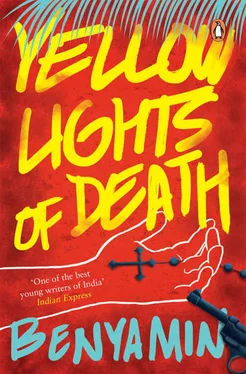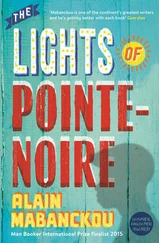He mentions visiting the eastern islands of Seynchi, home of the ruler of the Garcia Islands, Maharaja Veeravardhanan. He spoke fluently the Buddhists’ language of Pali, and most people in the region followed Buddhism. There was a beautiful monastery built on a cliff facing the sea. The king told Theogin that he had not allowed the Portuguese to step on to his soil and that he wished to be a French ally. He angrily asked Theogin why the French kings were not trying to defeat the evil Portuguese at sea.
Nowhere in our history had a King Veeravardhanan ruled Diego. But Theogin’s logs clearly record a meeting with a ruler of that name. Is he saying that that ruler belonged to the Andrapper lineage?
Before I left the room, I stood before the forefathers’ almirah once again. I felt intensely curious about the favourite objects of each one of them. I knew I was breaking Valyapapan’s trust and the Andrapper family rules, but I couldn’t resist the temptation.
I peeped out of the door to see if Valyapapan was standing guard somewhere. He had dozed off on his recliner. I could open the racks in peace. I went back into the room, slowly opened the topmost rack, which belonged to my Valyappachan Rostin Andrapper, and took out the box with his favourite object. There was an ashtray made of glass, and a set of pipes. I remembered that he was a chain-smoker. What else could be his favourite objects but an ashtray and pipes!
The next one was that of Felix Andrapper’s. His favourite was a nutcracker, which had intricate woodwork and gold enamel work. I wondered about an epoch when a nutcracker could be considered the most interesting artefact.
Then came Samuel Andrapper’s rack. It had an elephant tusk with goldwork and a long gold chain.
Stanley Andrapper’s box contained the best of surprises. It had a book, yellow with age, with torn edges and pages almost eaten up by silverfish. I eagerly flipped through it. There were just twelve pages to it. In a Malayalam so ancient that I read the title with great difficulty: Kanyabhogasooktham.
I was extremely eager to know its contents. But then I heard Valyapapan yelling, ‘Aren’t you done with your search? Stop it for now. Continue later.’ I quickly closed the almirah, but I didn’t feel like parting with the book. I was dying to read it. I hid it from Valyapapan by inserting it into the French travelogue, and briskly walked back to my room.
Once inside, I latched the door. I tried to read the text. It was hard work.
Author: Ittooppa Paili Avarkal. Not for sale. Printed at Madirasi Press.
The first page had these details, apart from the title. My curiosity grew manifold as it was written by a Christian, when usually these kind of books bore the name of sages.
Unlike the title Kanyabhogasooktham , or the Rules of Virgin Pleasure, which hinted that it was for those who wanted to enjoy women, the book was actually for women who wanted to be enjoyed, according to the foreword. ‘This is a concise version of the archaic work written on palm leaves by my legendary ancestor Itti Korata, keeping in mind those chaste women who want to make love before they get married. We express our gratitude to the Christian missionary who helped us in bringing it out.’
There was no mention of the name of the missionary. No clue of the year of publication. The foreword said that the idea of publishing the book was inspired by Samkshepavedartham , another book printed by the Madirasi Press. So, it could be assumed that this came out during the late 1700s or early 1800s. Very interesting things were mentioned in the book; although half of it was lost to silverfish and fungus, I soldiered on. The crux of the book was on how to choose a man if an unmarried and healthy woman wanted to have sex. It was advised right at the start that only if the woman could not control her feelings through prayers, fasting, fantasizing, self-stimulation, hard work and spirituality — only then should she invite a man to her bed. If the act could give the woman feelings of regret, sin, self-despair, abstinence or depression, she should preferably wait till she gets a husband.
Don’t choose men younger or of the same age, was the first instruction. The reason given was that these men are impatient, impulsive and ignorant of the subtleties of sex. They are incapable of satisfying women; instead, they will focus on their own pleasure. Their haste and inexperience will hurt you beyond limits. No pleasure, but only pain can come from them.
Don’t chose old and unmarried men — they have wrong notions about sex and lack confidence. You cannot get what you expect from them. Sex with them will make you depressed and averse to it.
Middle-aged married men are the best. More than looking for their pleasure, they will seek yours. Their knowledge will help avoid pain. Their patience will make you happy. Their experience will protect you from getting pregnant.
But beware of men with more than four children: they lack control. Beware of those with children in quick succession: they are easily satisfied. Beware of the fat ones: they are lazy. Beware of men who fight with their wives: they will be dishonest. Beware of junkies: they are irritating. It was a long list. My favourite among them was: Beware of scholars, lawyers and artists — they are crazy sex freaks, but incapable of ‘doing anything’.
I wanted to read the entire book without skipping a word. But Chettathi came to my room to ask for something. I had to quickly hide the book under the tablecloth. I couldn’t get back to it for the rest of the day.
That night, for no reason, my mind was awash with memories of Anpu. Senthil’s sister, Anpu.
Cardiac Arrest
I stayed in bed longer than usual, unable to free myself from the previous night’s dreams. Usually, dreams fade away by the next morning. But those particular dreams remained vivid in my memory. I began to doubt as to which version of me was more real: the person in my dream, or the person in reality. For me, both are experiences — dream and reality. The mind engages with both with the same intensity. How can we say which is true and which is fake? And sometimes, we do wish for dreams to continue into life and life to continue into dreams. I tried to fulfil the wish by daydreaming. But that didn’t help much. I had to meet Anpu to gain some control over my dreams. I freshened up and left for Cherar Peruntheruvu.
Senthil’s house was dead silent after all the hullabaloo of after-death ceremonies. The only reminder of a death was a small pandal stretching out of the house. When I rang the bell, Senthil’s father opened the door. He was surprised to see me. ‘ Kanna , you are here so early in the morning.’ He stepped on to the verandah, hugged me and took me inside.
‘I had to come this way for something, so I thought of popping in for a short while.’
‘Good, good, I’m glad to see you. Nobody visits us. Only you two classmates come. The house has gone silent. Anpu, look who is here!’
Anpu came into the hall. Either she had woken up late or gone back to bed after getting up. She looked drowsy as she bundled up her hair. But it only added to her beauty. Truly beautiful girls look even better unadorned. I felt lucky to have seen Anpu in such a state.
‘What news?’ she asked me with a smile tinged with sorrow.
‘Nothing. I’m fine.’
Thus ended the conversation. It was like none of us had anything to say. We were each of us lonely in our own tent of memories. Why did I rush here? Yeah, to see Anpu, but I also had some questions in mind about Senthil. However, at that point I couldn’t recall any of them. ‘I dropped in while passing by. See you later,’ I said, getting up.
‘I’ll make some coffee,’ Anpu said.
‘No. It’s fine.’
Читать дальше












